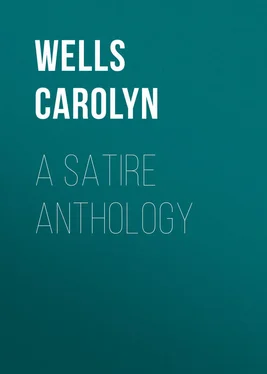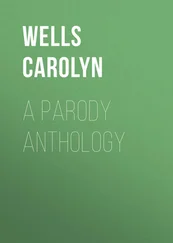Carolyn Wells - A Satire Anthology
Здесь есть возможность читать онлайн «Carolyn Wells - A Satire Anthology» — ознакомительный отрывок электронной книги совершенно бесплатно, а после прочтения отрывка купить полную версию. В некоторых случаях можно слушать аудио, скачать через торрент в формате fb2 и присутствует краткое содержание. Жанр: Юмористические книги, foreign_humor, на английском языке. Описание произведения, (предисловие) а так же отзывы посетителей доступны на портале библиотеки ЛибКат.
- Название:A Satire Anthology
- Автор:
- Жанр:
- Год:неизвестен
- ISBN:нет данных
- Рейтинг книги:5 / 5. Голосов: 1
-
Избранное:Добавить в избранное
- Отзывы:
-
Ваша оценка:
- 100
- 1
- 2
- 3
- 4
- 5
A Satire Anthology: краткое содержание, описание и аннотация
Предлагаем к чтению аннотацию, описание, краткое содержание или предисловие (зависит от того, что написал сам автор книги «A Satire Anthology»). Если вы не нашли необходимую информацию о книге — напишите в комментариях, мы постараемся отыскать её.
A Satire Anthology — читать онлайн ознакомительный отрывок
Ниже представлен текст книги, разбитый по страницам. Система сохранения места последней прочитанной страницы, позволяет с удобством читать онлайн бесплатно книгу «A Satire Anthology», без необходимости каждый раз заново искать на чём Вы остановились. Поставьте закладку, и сможете в любой момент перейти на страницу, на которой закончили чтение.
Интервал:
Закладка:
THE WILL
BEFORE I sigh my last gasp, let me breathe,
Great Love, some legacies: Here I bequeathe
Mine eyes to Argus, if mine eyes can see;
If they be blind, then, Love, I give them thee;
My tongue to fame; to embassadors mine ears;
To women or the sea, my tears.
Thou, Love, hast taught me heretofore,
By making me serve her who had twenty more,
That I should give to none but such as had too much before.
My constancy I to the planets give;
My truth to them who at the court do live;
My ingenuity and openness
To Jesuits; to buffoons my pensiveness;
My silence to any who abroad have been;
My money to a Capuchin.
Thou, Love, taught’st me, by appointing me
To love there where no love received can be,
Only to give to such as have an incapacity.
My faith I give to Roman Catholics;
All my good works unto the schismatics
Of Amsterdam; my best civility
And courtship to a university;
My modesty I give to soldiers bare;
My patience let gamesters share.
Thou, Love, taught’st me, by making me
Love her that holds my love disparity,
Only to give to those that count my gifts indignity.
I give my reputation to those
Which were my friends; mine industry to foes;
To schoolmen I bequeathe my doubtfulness;
My sickness to physicians, or excess;
To Nature all that I in rhyme have writ;
And to my company my wit.
Thou, Love, by making me adore
Her who begot this love in me before,
Taught’st me to make as though I gave, when I do but restore.
To him for whom the passing bell next tolls
I give my physic-books; my written rolls
Of moral counsel I to Bedlam give;
My brazen medals unto them which live
In want of bread; to them which pass among
All foreigners, mine English tongue.
Thou, Love, by making me love one
Who thinks her friendship a fit portion
For younger lovers, dost my gifts thus disproportion.
Therefore I’ll give no more, but I’ll undo
The world by dying, because love dies too.
Then all your beauties will no more be worth
Than gold in mines where none doth draw it forth;
And all your graces no more use shall have
Than a sundial in a grave.
Thou, Love, taught’st me, by making me
Love her who doth neglect both thee and me,
To invent and practise this one way to annihilate all three.
SHAKESPEAREAN SATIRE
MY liege, I did deny no prisoners;
But I remember, when the fight was done,
When I was dry with rage and extreme toil,
Breathless and faint, leaning upon my sword,
Came there a certain lord, neat, trimly dress’d,
Fresh as a bridegroom; and his chin, new reap’d,
Show’d like a stubble-land at harvest-home.
He was perfuméd like a milliner,
And ’twixt his finger and his thumb he held
A pouncet-box, which ever and anon
He gave his nose and took ’t away again;
Who, therewith angry, when it next came there,
Took it in snuff: and still he smil’d and talk’d,
And as the soldiers bore dead bodies by,
He call’d them untaught knaves, unmannerly,
To bring a slovenly, unhandsome corse
Betwixt the wind and his nobility.
With many holiday and lady terms
He question’d me; among the rest, demanded
My prisoners in your Majesty’s behalf.
I then, all smarting with my wounds being cold,
To be so pester’d with a popinjay,
Out of my grief and my impatience,
Answer’d neglectingly I know not what,
He should, or he should not; for he made me mad
To see him shine so brisk, and smell so sweet,
And talk so like a waiting-gentlewoman
Of guns and drums and wounds – God save the mark! —
And telling me the sovereign’st thing on earth
Was parmaceti for an inward bruise;
And that it was great pity, so it was,
This villainous saltpetre should be digg’d
Out of the bowels of the harmless earth,
Which many a good tall fellow had destroy’d
So cowardly; and but for these vile guns,
He would himself have been a soldier.
This bald, unjointed chat of his, my lord,
I answer’d indirectly, as I said;
And I beseech you, let not this report
Come current for an accusation
Betwixt my love and your high Majesty.
FROM “LOVE’S LABOUR’S LOST”
THIS fellow pecks up wit, as pigeons pease,
And utters it again when God doth please.
He is wit’s pedler, and retails his wares
At wakes and wassails, meetings, markets, fairs;
And we that sell by gross, the Lord doth know,
Have not the grace to grace it with such show.
This gallant pins the wenches on his sleeve;
Had he been Adam, he had tempted Eve.
He can carve, too, and lisp; why, this is he
That kiss’d his hand away in courtesy;
This is the ape of form, monsieur the nice,
That, when he plays at table, chides the dice
In honourable terms; nay, he can sing
A mean most meanly; and in ushering,
Mend him who can: the ladies call him sweet;
The stairs, as he treads on them, kiss his feet.
This is the flower that smiles on every one,
To show his teeth as white as whale’s bone;
And consciences that will not die in debt
Pay him the due of honey-tongued Boyet.
See where it comes! – Behaviour, what wert thou
Till this man show’d thee? and what art thou now?
FROM “AS YOU LIKE IT”
ALL the world’s a stage,
And all the men and women merely players:
They have their exits, and their entrances;
And one man in his time plays many parts,
His acts being seven ages. At first the infant,
Mewling and puking in the nurse’s arms:
Then the whining schoolboy, with his satchel,
And shining morning face, creeping like snail
Unwillingly to school: And then the lover,
Sighing like furnace, with a woful ballad
Made to his mistress’ eyebrow: Then a soldier,
Full of strange oaths, and bearded like the pard,
Jealous in honour, sudden and quick in quarrel,
Seeking the bubble reputation
Even in the cannon’s mouth: And then the justice,
In fair round belly with good capon lin’d,
With eyes severe, and beard of formal cut,
Full of wise saws and modern instances;
And so he plays his part: The sixth age shifts
Into the lean and slipper’d pantaloon,
With spectacles on nose, and pouch on side;
His youthful hose well sav’d, a world too wide
For his shrunk shank; and his big manly voice,
Turning again toward childish treble, pipes
And whistles in his sound: Last scene of all,
That ends this strange eventful history,
Is second childishness and mere oblivion,
Sans teeth, sans eyes, sans taste, sans everything.
HORACE CONCOCTING AN ODE
TO thee, whose forehead swells with roses,
Whose most haunted bower
Gives life and scent to every flower,
Whose most adoréd name encloses
Things abstruse, deep, and divine;
Whose yellow tresses shine
Bright as Eoan fire:
Oh, me thy priest inspire!
For I to thee and thine immortal name,
In – in – in golden tunes,
For I to thee and thine immortal name —
In – sacred raptures flowing, flowing, swimming, swimming:
In sacred raptures swimming,
Immortal name, game, dame, tame, lame, lame, lame,
(Foh) hath, shame, proclaim, oh —
In sacred raptures flowing, will proclaim. (No!)
Oh, me thy priest inspire!
For I to thee and thine immortal name,
In flowing numbers filled with spright and flame,
(Good! good!)
In flowing numbers filled with spright and flame.
Интервал:
Закладка:
Похожие книги на «A Satire Anthology»
Представляем Вашему вниманию похожие книги на «A Satire Anthology» списком для выбора. Мы отобрали схожую по названию и смыслу литературу в надежде предоставить читателям больше вариантов отыскать новые, интересные, ещё непрочитанные произведения.
Обсуждение, отзывы о книге «A Satire Anthology» и просто собственные мнения читателей. Оставьте ваши комментарии, напишите, что Вы думаете о произведении, его смысле или главных героях. Укажите что конкретно понравилось, а что нет, и почему Вы так считаете.












